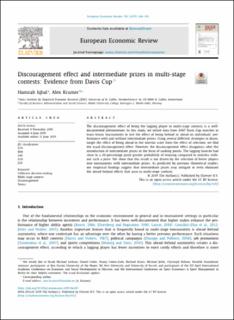Discouragement effect and intermediate prizes in multi-stage contests : evidence from Davis Cup
Peer reviewed, Journal article
Published version

Åpne
Permanent lenke
https://hdl.handle.net/11250/3095152Utgivelsesdato
2019Metadata
Vis full innførselSamlinger
- Artikler [412]
- Publikasjoner fra Cristin [429]
Originalversjon
European Economic Review. 2019, 118 (September), 364-381. 10.1016/j.euroecorev.2019.06.001Sammendrag
The discouragement effect of being the lagging player in multi-stage contests is a well-documented phenomenon. In this study, we utilize data from 2,447 Davis Cup matches in team tennis tournaments to test the effect of being behind or ahead on individuals’ performance with and without intermediate prizes. Using several different strategies to disentangle the effect of being ahead in the interim score from the effect of selection, we find the usual discouragement effect. However, the discouragement effect disappears after the introduction of intermediate prizes in the form of ranking points. The lagging favorite had close to a 20-percentage point greater probability of winning compared to matches without such a prize. We show that this result is not driven by the selection of better players into tournaments with intermediate prizes. As predicted by previous theoretical studies, our empirical findings suggest that intermediate prizes may mitigate or even eliminate the ahead-behind effects that arise in multi-stage contests. Keywords: collective decision-making, multi-stage contests, discouragement, tennis
